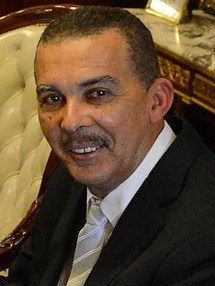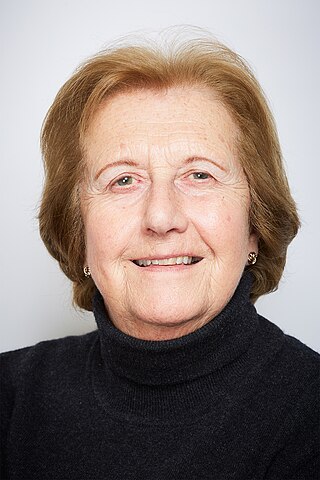Related Research Articles
The court system of Canada is made up of many courts differing in levels of legal superiority and separated by jurisdiction. In the courts, the judiciary interpret and apply the law of Canada. Some of the courts are federal in nature, while others are provincial or territorial.
Karl Terrence Hudson-Phillips, ORTT, QC was an Attorney-General of Trinidad and Tobago and a judge of the International Criminal Court. He was also lead counsel in the murder trial of Grenadian Prime Minister Maurice Bishop.

The Caribbean Court of Justice is the judicial institution of the Caribbean Community (CARICOM). Established in 2005, it is based in Port of Spain, Trinidad and Tobago.

The Supreme Court of South Australia is the superior court of the Australian state of South Australia. The Supreme Court is the highest South Australian court in the Australian court hierarchy. It has unlimited jurisdiction within the state in civil matters, and hears the most serious criminal matters. The Court is composed of a Chief Justice and as many other justices as may be required.

The Supreme Court of Singapore is a set of courts in Singapore, comprising the Court of Appeal and the High Court. It hears both civil and criminal matters. The Court of Appeal hears both civil and criminal appeals from the High Court. The Court of Appeal may also decide a point of law reserved for its decision by the High Court, as well as any point of law of public interest arising in the course of an appeal from a court subordinate to the High Court, which has been reserved by the High Court for decision of the Court of Appeal.
Gillian Lucky is a Justice of Appeal at the Supreme Court of Judicature for Trinidad and Tobago. She was previously a High Court Judge, Director of the Police Complaints Authority, and a Member of Parliament for Pointe-à-Pierre.

The High Court of Singapore is the lower division of the Supreme Court of Singapore, the upper division being the Court of Appeal. The High Court consists of the chief justice and the judges of the High Court. Judicial Commissioners are often appointed to assist with the Court's caseload. There are two specialist commercial courts, the Admiralty Court and the Intellectual Property Court, and a number of judges are designated to hear arbitration-related matters. In 2015, the Singapore International Commercial Court was established as part of the Supreme Court of Singapore, and is a division of the High Court. The other divisions of the high court are the General Division, the Appellate Division, and the Family Division. The seat of the High Court is the Supreme Court Building.
Faretta v. California, 422 U.S. 806 (1975), was a case in which the Supreme Court of the United States held that criminal defendants have a constitutional right to refuse counsel and represent themselves in state criminal proceedings.
Strickland v. Washington, 466 U.S. 668 (1984), was a landmark Supreme Court case that established the standard for determining when a criminal defendant's Sixth Amendment right to counsel is violated by that counsel's inadequate performance.

Lesbian, gay, bisexual, and transgender (LGBT) persons in Belize face legal challenges not experienced by non-LGBT citizens, although attitudes have been changing in recent years. Same-sex sexual activity was decriminalized in Belize in 2016, when the Supreme Court declared Belize's anti-sodomy law unconstitutional. Belize's constitution prohibits discrimination on the basis of sex, which Belizean courts have interpreted to include sexual orientation.

The Judiciary of Barbados is an independent branch of the Barbadian government, subject only to the Barbadian Constitution. It is headed by the Chief Justice of Barbados. Barbados is a common law jurisdiction, in which precedents from English law and British Commonwealth tradition may be taken into account.

Anthony Thomas Aquinas Carmona is a Trinidadian politician who was the fifth President of Trinidad and Tobago from 2013 to 2018. Previously, he was a High Court Judge at the Supreme Court of Trinidad and Tobago, and he served as a Judge of the International Criminal Court from 2012 to 2013.
James Kirkpatrick Stewart is a Canadian lawyer with over thirty years of experience as Crown counsel handling criminal trials and appeals for the prosecution, including more than eight years working with the United Nations in international criminal law prosecutions as a trial and appellate counsel and legal manager. Stewart was nominated by Fatou Bensouda, Prosecutor for the International Criminal Court (ICC) in The Hague, as one of three candidates for election to the post of ICC Deputy Prosecutor (Prosecution). He was duly elected by the Assembly of States Parties on 16 November 2012 for a period of nine years. Mr Stewart was sworn in on 8 March 2013 and as Deputy Prosecutor of the ICC, he will report directly to the Prosecutor.

Sir Henry Cowper Gollan CBE KC was a British lawyer and judge. He served as attorney general and chief justice of a number of British colonies in the early 20th century. His last position before retirement was as Chief Justice of Hong Kong.
Anthony Amos Lucky is a judge of the United Nations International Tribunal for the Law of the Sea. As a retired Court of Appeal Judge, Anthony served in the legal system of Trinidad and Tobago as a magistrate for ten years prior to becoming a judge for another 16 years. He is the recipient of the Chaconia Medal (Gold) for his long and meritorious service to Trinidad and Tobago.

The judiciary of Trinidad and Tobago is a branch of the Government of Trinidad and Tobago that interprets and applies the laws of Trinidad and Tobago, to ensure equal justice under law, and to provide a mechanism for dispute resolution.
In the United States, a public defender is a lawyer appointed by the courts and provided by the state or federal governments to represent and advise those charged with a crime or crimes who cannot afford to hire a private attorney. Public defenders are full-time attorneys employed by the state or federal governments. The public defender system is one of several types of criminal legal aid, the most common other system being appointed private counsel paid for by the government.

Joanna Korner is a British judge of the International Criminal Court.

The Supreme Court of Judicature for Trinidad and Tobago is the superior court for Trinidad and Tobago. It was established in accordance with the Constitution of Trinidad and Tobago and the Supreme Court of Judicature Act, 1962.
Reshma Sharma is a Trinidad and Tobago lawyer and judge. She is currently serving as the Solicitor General of the Cayman Islands, a position that she has held since 1 August 2019.
References
- ↑ Press release on the ASP's nineteenth session (first resumption)
- ↑ ICC: Six new judges sworn in today at the seat of the International Criminal Court.
- 1 2 3 ICC Application CV, as a reference for the whole career
- ↑ ICC's publication of election results. Alexis-Windsor was elected in round no. 8.
- ↑ "Public Roundtable IV". Assembly of State Parties of the International Criminal Court. 2020-11-06. p. Time Index Minute 08:11 Seconds. Retrieved 2021-03-13.